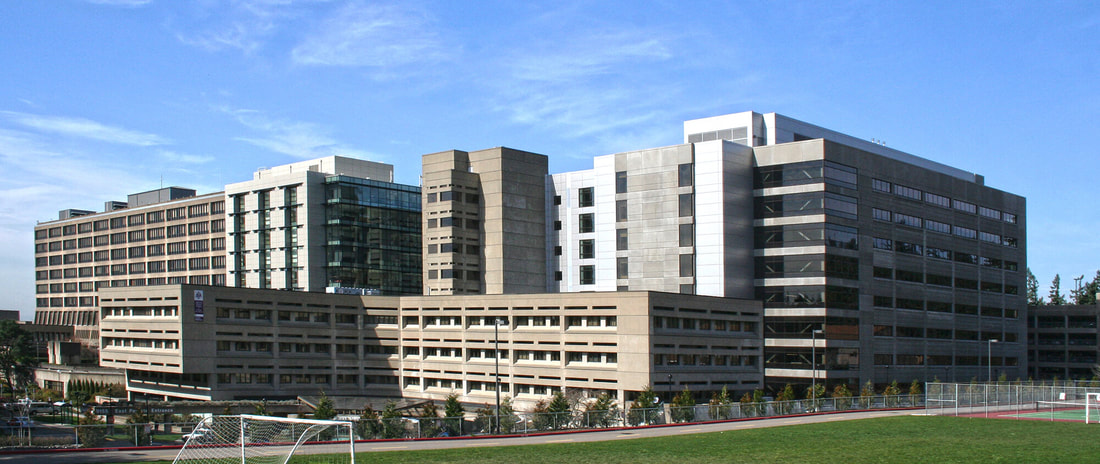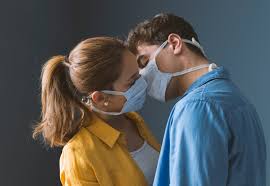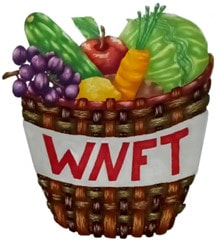 I forgot to take a mask with me yesterday. That's OK, I thought. I wouldn't be around people. I just had a pickup at the hospital, a drop-off at the low-income senior housing, and a quick run into the church. I had no idea. I did the old folks first since the van was too full of food to fit the hospital donation. The manager there gets volunteers and they unload for me. I don't have to go in the building or near anybody. And they are so grateful for the food. I might have more later, I told them, because the hospital usually has several gallons of hearty soup. It's not all that weird driving around -- there's just not traffic. Maybe a tenth of the normal number of cars, which is fine by me. A quick easy drive to the hospital, 10 minutes to downtown from there, I'd be home by lunch time. I pulled up to the loading dock as usual and saw that the bay I usual enter through was closed. I walked up the ramp and pushed the buttons. Hmm, nothing. This door is always unlocked because it's by the compactor, in use 24/7. I walked back down the ramp (a little tough going downhill with my bad knee but no biggie) and yelled into the one bay door that was partially open. Nothing. No one in sight. The regular man-door on this side of the building was locked a couple of days ago so that's not an option. What to do? I called the kitchen to let them know I was there. Could someone push the cart out to the loading dock? They didn't think so and got someone else to talk to me. "No, you can't get in over there. You have to go to a main entrance. Everybody gets their temperature taken. Go to the east pavilion." I know where that is, although I'm concerned about my ability to find and walk to the kitchen from there, and how will I get the food out? I drive around to the east pavilion and park in the passenger drop-off zone, hanging my disabled plaque just in case. I hobble in to the building, where everyone has masks on except me. I have my gloves and hair net so I feel partially prepared. The nurse at the door takes my temp without actually touching my forehead - cool! - asks me why I'm there, and doesn't know how to get to the kitchen. The volunteer at the info desk also doesn't know, except I should take the gold elevator down. This much I know. I say I'm concerned about getting the donation across the campus due to my bone and arthritis issues in my knee and feet and ask if she could call the kitchen. I wasn't thinking and had left my phone in the car. No, she's not able to call them, and she turns dismissively to answer an incoming call. People are tense, I get it. I'll find my way. There are more people walking around than I expected, but they're trying to stay six feet apart. I can see nervousness in a lot of eyes -- more patients have died from the virus here than any other hospital in the state, and our county has by far the most cases. I wonder how many people are at home watching Outbreak and Contagion. I walk past the closed cafeteria, down the hall, and across to the gold elevators that go down to the basement. The basement is a whole other world. More people but not so many masks. Rushing. Patients on gurneys outside X-ray and diagnostic imaging, outside testing departments I know nothing about. The billing department is closed. At least they have their priorities straight! Nobody is talking. The silence is eerie. There are three long parallel hallways down here. I choose the north side knowing the kitchen is sort of that way. Is it by nutrition services? Nope, most of that wing is closed. After quite a long walk I see a dish cart. I follow it and find the dish room and from there, the kitchen. Good thing I have my hairnet on so I'm allowed to make my way from dish-washing to plating to hot prep then cold prep and finally the walk-ins on the receiving side. There's Umberto, who takes me to the donation cart and pulls a few things off, adds a few things on, and pushes it toward me with a nod. Umm, Umberto? I can't push this six-foot tall cart with 300 pounds of food all the way across the hospital, up the elevator, through the east pavilion, across the lobby and out to my car, unload it, and then bring it back. I'm already struggling to walk any farther. I feel anxiety rising in my chest like I haven't felt in years. A knot in my stomach. Oh no, are my eyes tearing up? Crap. He takes pity on me and says he'll wheel it out to the loading dock. Thank God, I think, but gosh it would have been nice if we'd started there when I was AT the loading dock. I tell him it'll take at least 10 minutes for me to get there. OK. Let's do this. I go back the way I came. I think. All the hallways and doorways look the same, and there aren't many signs down here where visitors rarely come. I'm limping now and each step hurts, but I'll make it; I always do. Eventually I see the purple elevators. I don't remember passing them before but I want to get upstairs where there are fewer patients and more masks. It's pretty creepy down here, especially without my mask. I'm high risk. I don't belong here. This was a big mistake. People are dying in this building. Knute would kill me if I got the virus and died on him. Up the purple elevators, realizing that I somehow passed the gold elevators, but I make my way to the haunted lobby, past the thermometer nurse, and out to my car. What a strange sensation to get outside and suddenly feel like it's safe to breathe. My previous blog post was more spot-on than I'd realized. I wan't exposed. I wasn't exposed. My new mantra, I wasn't exposed. I sit in the driver's seat and try to pull my left leg into the car. It won't budge. I know my knee is bad. I know I should have had surgery three years ago. I know! But come on, just bend so I can go home! It takes a minute for my strong will (read stubborn hard-head) to bend and lift the knee. Back in the van I take a few deep breaths and try to calm my heart. It's under control. I don't have to limp anymore. I don't have to breathe used air anymore. It'll be OK. But I still can't quite pull myself together. Umberto is at the dock waiting for me, loads the boxes in the van, looks at me sympathetically, and asks if I'm OK. It's obvious I'm not OK, so I just tell him I doubt I'll be back until the lock-down is lifted. He understands. Home. I need to go home. No stopping at the church, no dropping off the food. I feel like I just left the opening scene of a zombie movie. Or just escaped a life sentence. Or betrayed the promise I made to my husband to be careful, be safe. My knee and foot are throbbing, but I hardly notice over the knot in my chest. It wasn't a narrow escape. I'm fine. But man, it sure feels like a narrow escape. I drive home reminding myself that there's a stay-home order, not just a request. I'm high risk. I'm non-essential. I'm an arrogant ass who has no business out here. I'm going home. And I'm staying there. Big dummy.
2 Comments
 Surreal world all of a sudden, isn't it? There's no traffic, no place I have to be, nothing on the calendar. I'm still going out, because there's excess food everywhere and so many people who need it. But I'm doing as little as possible and being very careful. My husband worries. I have a history of respiratory disease, asthma, antibiotic resistance -- I'm the person authorities are telling to stay home. But I have gloves, masks, hand sanitizer, even hair nets. I'm staying away from people and only touching packaging, no unwrapped food. We aren't sorting donations or delivering food boxes. Donations are minimally handled, just driven from the donor to whatever large enough hunger-relief organization we can find. Getting out of the van this morning in downtown Portland, at a store I've never visited, I thought about the air. How many people have breathed this particular air? It's a creepy thought. I can avoid touching surfaces and stay six feet away from people, but I have to breathe. We all have to breathe. This is a new sensation for most of us, but not all of us. People all over the world have suffered because basic survival necessities simply aren't there. We're starting to see, for the first time, what it feels like to need to breathe but not know if the very air will kill us. To need water and not know whether it's clean. To need food and have no idea where it's been, who's touched it, whether anybody sneezed on it, whether it's fresh enough to be safe. I'm reminded of working on the Women's March on Portland in January, 2017. It wasn't just women feeling anger and frustration that the first woman president was cheated out of the position for which she's been preparing her whole life. It was women feeling unseen, unsafe, undervalued and powerless. It was traumatic for the middle-class, middle-aged, white suburban mom that I am, as it was for most of my circle, my world. But my world isn't THE world. The transgender, multi-racial, low-income activists who were working with me took the opportunity to let me know that none of this was new -- it was just new to me. They took the opportunity to educate us and used words like intersectional and woke. I am not intersectional, nor are the woman who claim to be low-income, homeless, disabled, or any combination of those fairly common sources of prejudice. Intersectionalism refers to the oppression that comes from multiple powers granted to multiple segments of society that increase the likelihood of certain people slipping through the cracks of justice. A black woman doesn't get the same treatment as a white one. Nor does a trans woman. How about the disabled African-Asian American trans woman who's face is disfigured? Most of us will find some excuse not to care about the person who is different from us in so many ways that we simply cannot relate to them. I know I've avoided the woman with no arms or legs who can only speak a little. I think if we could have a conversation I might make more effort, but I didn't. I don't see her anymore and I feel guilt for not caring enough. Her differences don't change her humanity. She was able to accomplish an extraordinary amount, running sound and video projection for church services (using a pencil in her mouth) but unable to use a toilet by herself. So this burden isn't new. It's just new FOR US. How can we embrace it and use it to help us understand what it's like to live in Flint Michigan where the water could kill you? Next door to the pig farm that blows the animal detritus across the landscape and fills the air? The poverty-stricken masses who have to take whatever food is given, whether it's safe to eat or not, and watch their babies die from lack of calories? I'm uncomfortable with the air right now. I think I'd like to buy an air purifier. I have to remember how incredibly blessed and fortunate I am that I have that option. And I owe it to myself to be aware of the people who live with this kind of fear, lack, inconvenience and powerlessness their whole lives. |
AuthorSusie Snortum is passionate about improving society's compassion for meeting basic human needs -- food, shelter, clean water, and dignity. Archives
September 2020
Categories |
We appreciate your support!
Hours
|
Telephone
|
Email
|
ADDRESS: 17850 NW Park View Blvd, Portland, OR 97229 United States

 RSS Feed
RSS Feed